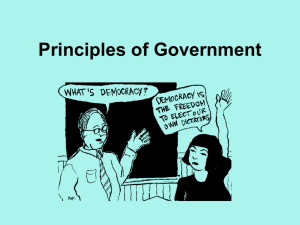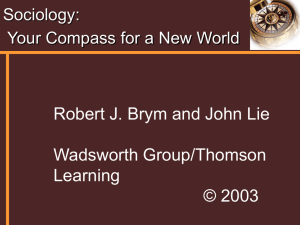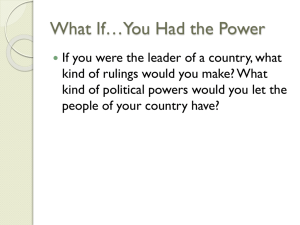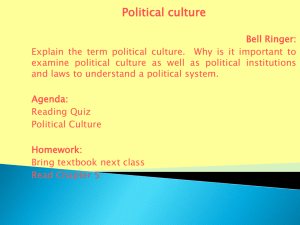2.1.welcome_from_f.peterfi-hacd.doc
advertisement
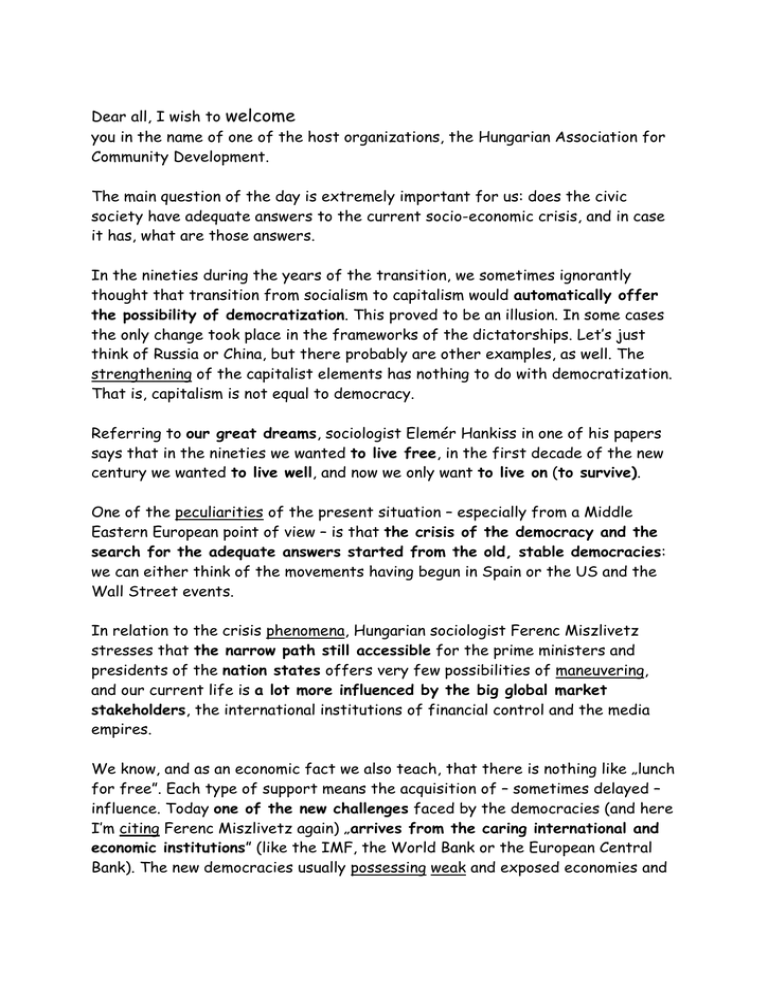
Dear all, I wish to welcome you in the name of one of the host organizations, the Hungarian Association for Community Development. The main question of the day is extremely important for us: does the civic society have adequate answers to the current socio-economic crisis, and in case it has, what are those answers. In the nineties during the years of the transition, we sometimes ignorantly thought that transition from socialism to capitalism would automatically offer the possibility of democratization. This proved to be an illusion. In some cases the only change took place in the frameworks of the dictatorships. Let’s just think of Russia or China, but there probably are other examples, as well. The strengthening of the capitalist elements has nothing to do with democratization. That is, capitalism is not equal to democracy. Referring to our great dreams, sociologist Elemér Hankiss in one of his papers says that in the nineties we wanted to live free, in the first decade of the new century we wanted to live well, and now we only want to live on (to survive). One of the peculiarities of the present situation – especially from a Middle Eastern European point of view – is that the crisis of the democracy and the search for the adequate answers started from the old, stable democracies: we can either think of the movements having begun in Spain or the US and the Wall Street events. In relation to the crisis phenomena, Hungarian sociologist Ferenc Miszlivetz stresses that the narrow path still accessible for the prime ministers and presidents of the nation states offers very few possibilities of maneuvering, and our current life is a lot more influenced by the big global market stakeholders, the international institutions of financial control and the media empires. We know, and as an economic fact we also teach, that there is nothing like „lunch for free”. Each type of support means the acquisition of – sometimes delayed – influence. Today one of the new challenges faced by the democracies (and here I’m citing Ferenc Miszlivetz again) „arrives from the caring international and economic institutions” (like the IMF, the World Bank or the European Central Bank). The new democracies usually possessing weak and exposed economies and positions – this is what the post-communist countries are – are especially likely to become ‘no choice’ democracies. These caring institutions, intentionally or not, prioritize the democracy notions accepted by them – that means that (by choosing their partners or structuring the dialogues) they alter the socio-political context to a great extent, and influence the process of democratizing the democracy. In this (competitive) process the role played by the civic society is being radically reduced. In Hungary, we experience, amongst other phenomena, the radical impoverishment of the communities and the NGOs. In addition, it is not only that we have had less money during the previous two years, but the political decision makers have been replaced, and the vision of the state concerning its role to be played – and the role players – in its relation to the civic society has considerably changed. This double process has happened so fast that we have had no chance to adapt. It is obvious that we cannot avoid turning into a direction decreasing our dependence on the government which has been too strong so far. It is not easy to find new and more independent financial (and other) resources and build a new system based on these in an economy and society being impoverished. However, the extreme disappointment of the public towards the political and ruling sector and the degradation of public trust on one side, and the creativity of the civic society, the strengthening of the networks and many other new phenomena on the other, may lead to a new situation. Perhaps we will know more of that by the end of this summer university. I wish you to meet exciting experiences, and to do a good job. Ferenc Péterfi
